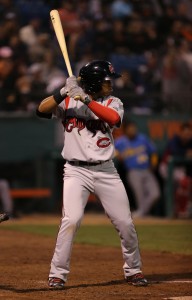Signing Ruben Tejada to be their starting shortstop, rather than promoting Aledmys Diaz to the job, was the right move for the Cardinals, Bernie Miklasz writes for 101Sports.com. Diaz went 4-for-4 with two doubles in the Spring Training game after Jhonny Peralta went down with a thumb injury. But his production has since slowed, and Diaz has very little experience in Triple-A (where he was optioned Sunday after Tejada’s signing became official). It’s best for him to begin his season there to see if he can build on the success he enjoyed in the second half of last season, Miklasz argues. Here’s more from the Central divisions.
- Carlos Correa is an incredibly exciting young shortstop, but in comparison, Francisco Lindor of the Indians doesn’t get enough hype, Ken Rosenthal of FOX Sports argues. Lindor got off to a slow start after being promoted to the big leagues last year but batted .370/.413/.500 in August and .325/.366/.592 the rest of the season. “How many times do you see a kid come up in the first 100 at-bats and just go off, and then the league makes its adjustments?” asks manager Terry Francona. “It was kind of the other way around.” One reason for his late-season success, Lindor says, was bunting — he had nine sacrifices in August. By bunting (which Francona wasn’t necessarily thrilled with, but which he did allow), Lindor learned to track the ball better, setting himself up for success in future plate appearances.
- Pirates ace Gerrit Cole is one of several pre-arbitration players who were reportedly unhappy with the salary his team offered him for the 2016 season, Nathaniel Rakich of VICE Sports notes. (Cole will receive $541K from the Bucs after posting a 2.60 ERA, 8.7 K/9 and 1.9 BB/9 in 2015.) But going public with their displeasure in an effort to affect the next Collective Bargaining Agreement might not be the best course of action, Rakich argues. The MLB minimum salary is a pittance compared to what many players get, but it’s still a lot of money by the standards of most MLB fans. And the 1994-95 strike, in which players and owners negotiated through what Rakich calls “grandstanding,” demonstrates the perils of trying to change labor conditions by arguing through the media.
 The 21-year-old is widely viewed as a top 10 prospect. He’s ranked fourth by Baseball Prospectus, sixth by ESPN’s Kieth Law, and ninth by Baseball America. FanGraphs’ Kiley McDaniel is the sole guru to rank him outside the top 10 (14th). Lindor was the eighth overall pick of the 2011 Rule 4 draft.
The 21-year-old is widely viewed as a top 10 prospect. He’s ranked fourth by Baseball Prospectus, sixth by ESPN’s Kieth Law, and ninth by Baseball America. FanGraphs’ Kiley McDaniel is the sole guru to rank him outside the top 10 (14th). Lindor was the eighth overall pick of the 2011 Rule 4 draft.